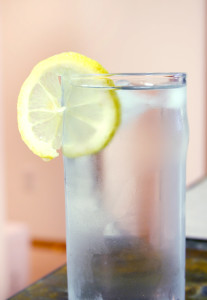The 3 simple steps to staying hydrated are:
- Fill up your water bottles at the beginning of the day and bring them with you to work, school or on your errands. That way you will know exactly how much water you are drinking in a day and will have it conveniently available.
- Adding a little lemon or cucumber to your water can give it a refreshing taste and may make it more pleasant to get the water you need.
- Next time you are hungry or tired, first drink a large glass of water . . . then see how you feel. Often when we are really just a little dehydrated.
Normally, drinking 6-8 glasses of water will keep you hydrated, but may want to consider drinking more if you . . .
- exercise
- drink caffeine or alcohol
- are taking a medication that is a diuretic (such as high blood pressure medicine)
- live in a hot climate
- eat a high protein diet
Why is it so important to stay hydrated? Water performs many essential functions in our bodies, including:
- Water helps dissolves nutrients in your body so that they can be absorbed.
- Water is key in many metabolic processes.
- Water is a component of blood, and therefore important for transporting chemicals and nutrients to your cells and tissues.
- Water lubricates your joints.
- Each of your cells is bathed in a watery fluid.
- Water carries waste materials from your cells to your kidneys so they can be filtered and eliminated.
- Water absorbs and transports heat, which helps you maintain a balanced body temperature.
- Water lubricates your food so that it can more easily be swallowed and move through our esophagus.
- Water is necessary to all parts of the digestive process.
Stay tuned for my next blog post about the thirst mechanism . . . . What happens when you no longer feel thirsty?


